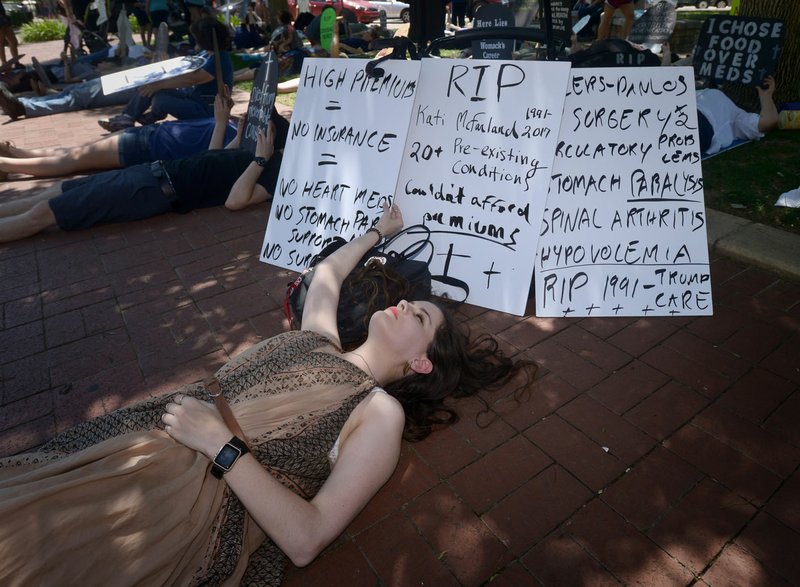The Republican health care bill in Congress could open the door to changes in the insurance coverage for half of Arkansans, alarming residents with serious and expensive health concerns and drawing a mix of praise and caution from several Republican state officials.
The American Health Care Act that narrowly passed the House this month and heads to the Senate would restrict Medicaid coverage and allow states in some circumstances to loosen the rules on health insurance for people who go without or buy it on their own or through larger employers. Census estimates show about one in two Arkansans fell into those coverage categories in 2015.
By the numbers
The Affordable Care Act, also called Obamacare, offers tax credits for plans on the individual, non-employment-based health insurance market. The Republican bill in Congress would change who gets how much from the credit. These figures project the difference the Republican alternative would make for different ages and income levels in Benton and Washington counties in 2020.Individual
IncomeAge 27Age 40*Age 60
$20,000.00 -$490.00 compared with Obamacare -$240.00*-$3,960.00
$30,000.00 +$1,040.00 compared with Obamacare +$1,280.00*-$2,440.00
$40,000.00 +$2,000.00+$2,880.00*-$840.00
$50,000.00 +$2,000.00+$3,000.00*+$180.00
$75,000.00 +$2,000.00 +$3,000.00*+$4,000.00
$100,000.00 $0.00 +$500.00*+$1,500.00
Family of four with parents in their 40s
Income*Change in tax credit
$40,000*-$1,570
$50,000*-$140
$75,000*+$4,090
$150,000*+$10,000
60-year-old couple
Income*Change in tax credit
$25,000*-$8,780
$40,000*-$6,750
$50,000*-$4,780
$100,000*+$8,000
Source: Kaiser Family Foundation
Both Arkansas senators and several of their colleagues have said the Senate will make substantial changes to the bill, and the full range of changes allowed under the current proposal would require multiple federal, state and business decisions to happen.
Several residents who have depended on their health insurance to survive cancer and other severe ailments nonetheless said they fear the bill would make that coverage too expensive to use.
"I've had two lifetime limits already and I'm very close to my third," said Lyn Harris of Bella Vista, referring to coverage caps of $1 million apiece for treating cancer in her bone marrow and other troubles over the past 30 years. She took part in a "die-in" protest against the bill about a week ago in Bentonville.
"People think that it doesn't happen to you, and it does. Boom, that's it, and your life changes," she said.
Coverage caps for surgery and other services considered essential are banned by the Affordable Care Act, also called Obamacare, which remains law unless Congress and President Donald Trump agree on the House bill or another alternative.
House Republicans say their bill would save taxpayer money and lower some people's premiums while devoting tens of billions of dollars in the next decade to helping people like Harris afford their care, and some in the Senate have called it a good first step. All four Arkansas representatives voted for the bill.
A nonpartisan analysis on the proposal's impact from the Congressional Budget Office could come later this month.
"We do have to make sure we take the time to do it right," Sen. John Boozman, R-Ark., said in an interview, adding he expects the Senate's version will "look very different" and will take the budget office score into account. "We have to do something to stabilize the insurance markets and get more to a free-market situation, and that's where Obamacare just simply doesn't work."
Separating the high-risk
Obamacare aims to help people with low incomes or health needs by easing them into the insurance market. It requires insurance companies to offer coverage to all that includes prescription coverage, preventive services, mental health care and seven other care categories considered essential benefits. It expands Medicaid assistance to more people and offers income-based tax credits of sometimes thousands of dollars per year to help buy policies.
The law also requires taxpayers to have some coverage for their household or pay a tax penalty.
More than 20 million more people gained coverage because of the law, and Arkansas' uninsured rate tumbled from about 23 percent to about 10 percent, according to the polling company Gallup.
Obamacare has been fiercely criticized by Republicans and others for its taxes on high earners and some medical companies and its failure to keep monthly premiums for younger and healthier people from rising -- partly because insurance companies are now covering more of those people's costlier counterparts.
The Republican bill could separate some of the priciest policies from the rest of the market, which could mean less risky customers pay lower premiums.
States could ask the federal government for waivers to let them trim Obamacare's essential benefits and allow insurance companies to charge more for sick patients who don't buy continuous health insurance coverage. States must promise the changes will make insurance more affordable or accessible overall.
About one-third of Arkansas adults under 65 have a pre-existing condition of some kind that needs costlier care, according to the nonpartisan Kaiser Family Foundation, which collects and analyzes health care data and policy. Diabetes, high blood pressure and strokes are unusually common in the state, particularly among minority and rural populations.
Other changes would come with or without waivers, including a freeze on Medicaid dollars that would cut spending by almost $900 million and leave millions of people off the program, the Congressional Budget Office found.
Tax credits for buying insurance would go up or down by thousands of dollars, depending on someone's age and income, according to Kaiser.
The bill would let insurance companies charge older adults too young for Medicare more than they can under Obamacare.
People would no longer be required to buy insurance.
If one state succeeds in trimming essential benefits, employers of at least 50 people in any state could adopt the same limited coverage guidelines, though they'd still have incentive in the opposite direction to offer generous policies to employees, The Wall Street Journal reported this month based on how the bill interacts with Obamacare rules. Insurance for care that isn't essential can bring back lifetime spending caps.
Put it together and at least half of Arkansans could see their coverage or the rules governing it altered.
Around 44 percent of Arkansans in 2015 had insurance through employers, and a little more than half of the state's employees were at firms of at least 50 people, according to Kaiser and the Census; assuming the ones at larger firms are equally distributed among those with employer coverage, that comes to about a quarter of the state under the coverage of the larger firms. Another third or so of Arkansans were in Medicaid, the individual insurance market or are uninsured, based on Kaiser's count.
To help protect high-need patients from these changes, the bill provides $138 billion over the next nine years for states that receive waivers. The money can go to stabilizing insurance markets and taking the edge off premiums that become more expensive, essentially subsidizing high-risk pools of policies.
How much those high-risk pools would help, then, becomes a central concern in the debate over the bill's many pieces.
Learning from the past
Arkansas is one of almost three dozen states that ran high-risk pools before Obamacare, which featured a temporary nationwide high-risk pool in its first few years. The state pools altogether included more than 200,000 people in the end, including more than 3,000 in Arkansas whose conditions led insurance companies to reject them.
Liberal and conservative observers alike criticized the pools as chronically underfunded and expensive for customers. Arkansas' pool set premiums 50 percent higher than the overall market and set a lifetime limit of $500,000, similar to other states' setups. The number of people in Arkansas who would have qualified was likely 10 times the number who actually enrolled, Kaiser reported. Nationwide, the same gap comes to millions of people.
"For the people who purchased in it, it worked very well," said Mike Wilkinson, who served as chairman of the Arkansas pool's board from when it started in the 1990s. "There's no way of knowing how many people just didn't do it. I'm sure there were people that were priced out by it."
Whether the tens of billions of dollars in the bill are enough to prevent such shortfalls would depend on how many states choose the waiver options and how they spend the money they receive.
Conservative Obamacare critics James Capretta and Tom Miller in 2010 pegged the nationwide cost of an adequately funded high-risk pool at between $15 billion and $20 billion a year in a report in National Affairs magazine; liberal groups have estimated the cost far higher.
Kelly McCleary of Bentonville said she worries her 18-year-old daughter, who has needed chemotherapy and joint surgeries because of a blood disorder that causes a dangerously hyperactive immune system, will be "uninsurable" by the time she turns 26 and leaves the family's employer-sponsored policy if Arkansas goes the waiver route.
"High-risk pools just mean high-premium pools," McCleary said. "My challenge to America and to Congress is: My daughter's life and those like her -- what are we worth?"
Gov. Asa Hutchinson is waiting to see how the bill turns out before taking a position on the options it gives states, spokesman J.R. Davis said.
"He also recognizes that the House needed to pass a bill over to the Senate so the Senate could take up the legislation and make it better," Davis said, echoing Arkansas Rep. Steve Womack's statement. "I think to comment on anything as of right now would be premature."
Sen. Tom Cotton, R-Ark., is part of the Senate group focused on the bill and "is committed to ensuring all Arkansans with pre-existing conditions have access to affordable health care," a spokesman wrote in a brief email statement when asked about Cotton's stance and what the Senate might change.
Boozman said he supported the repeal of the mandate to buy insurance and the high-risk pool option seemed promising. The bill gives $15 billion specifically to a pool where people with costly health care needs pay the same premiums as everyone else and the government covers the rest, an arrangement called reinsurance. The concept could get more emphasis in the Senate, he said.
Maine tried such a system a few years ago and saw individual insurance premiums fall by half, according to a March report in the journal Health Affairs' blog, though the National Academy for State Health Policy and others say other factors also played a role in the drop.
"You really don't know that you're in a high-risk pool," Boozman said of the Maine model. "Those are the things that we're looking into."
Democrats have flatly opposed the bill as it stands, saying they're open to tweaking Obamacare but not undoing it. Arkansans pointed to several ways the law could be better, such as by controlling younger people's premiums more. Many called for a single-payer system, guaranteeing health care for everyone and using the government's negotiating power to bring down its cost.
"Let's just be prudent, let's be thoughtful about this," Julia Sampson of Fayetteville, who said she was denied coverage for years before Obamacare because of a false positive for rheumatoid arthritis, said of the congressional process and debate. "This is real life and real people."
NW News on 05/15/2017

